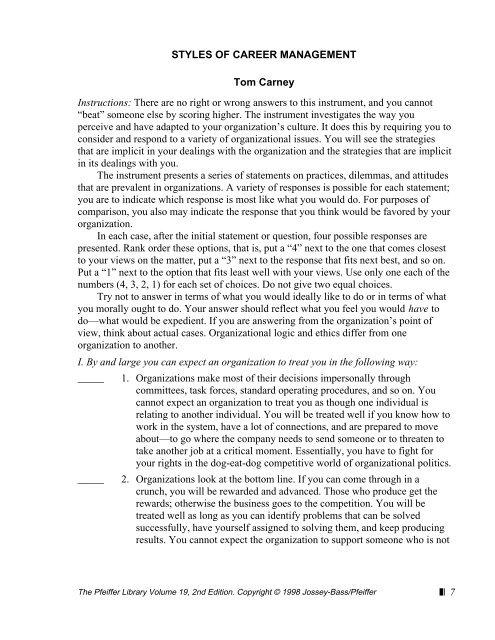motivational analysis of organizations
motivational analysis of organizations
motivational analysis of organizations
Create successful ePaper yourself
Turn your PDF publications into a flip-book with our unique Google optimized e-Paper software.
STYLES OF CAREER MANAGEMENT<br />
Tom Carney<br />
Instructions: There are no right or wrong answers to this instrument, and you cannot<br />
“beat” someone else by scoring higher. The instrument investigates the way you<br />
perceive and have adapted to your organization’s culture. It does this by requiring you to<br />
consider and respond to a variety <strong>of</strong> organizational issues. You will see the strategies<br />
that are implicit in your dealings with the organization and the strategies that are implicit<br />
in its dealings with you.<br />
The instrument presents a series <strong>of</strong> statements on practices, dilemmas, and attitudes<br />
that are prevalent in <strong>organizations</strong>. A variety <strong>of</strong> responses is possible for each statement;<br />
you are to indicate which response is most like what you would do. For purposes <strong>of</strong><br />
comparison, you also may indicate the response that you think would be favored by your<br />
organization.<br />
In each case, after the initial statement or question, four possible responses are<br />
presented. Rank order these options, that is, put a “4” next to the one that comes closest<br />
to your views on the matter, put a “3” next to the response that fits next best, and so on.<br />
Put a “1” next to the option that fits least well with your views. Use only one each <strong>of</strong> the<br />
numbers (4, 3, 2, 1) for each set <strong>of</strong> choices. Do not give two equal choices.<br />
Try not to answer in terms <strong>of</strong> what you would ideally like to do or in terms <strong>of</strong> what<br />
you morally ought to do. Your answer should reflect what you feel you would have to<br />
do—what would be expedient. If you are answering from the organization’s point <strong>of</strong><br />
view, think about actual cases. Organizational logic and ethics differ from one<br />
organization to another.<br />
I. By and large you can expect an organization to treat you in the following way:<br />
_____ 1. Organizations make most <strong>of</strong> their decisions impersonally through<br />
committees, task forces, standard operating procedures, and so on. You<br />
cannot expect an organization to treat you as though one individual is<br />
relating to another individual. You will be treated well if you know how to<br />
work in the system, have a lot <strong>of</strong> connections, and are prepared to move<br />
about—to go where the company needs to send someone or to threaten to<br />
take another job at a critical moment. Essentially, you have to fight for<br />
your rights in the dog-eat-dog competitive world <strong>of</strong> organizational politics.<br />
_____ 2. Organizations look at the bottom line. If you can come through in a<br />
crunch, you will be rewarded and advanced. Those who produce get the<br />
rewards; otherwise the business goes to the competition. You will be<br />
treated well as long as you can identify problems that can be solved<br />
successfully, have yourself assigned to solving them, and keep producing<br />
results. You cannot expect the organization to support someone who is not<br />
The Pfeiffer Library Volume 19, 2nd Edition. Copyright © 1998 Jossey-Bass/Pfeiffer ❚❘ 7

















